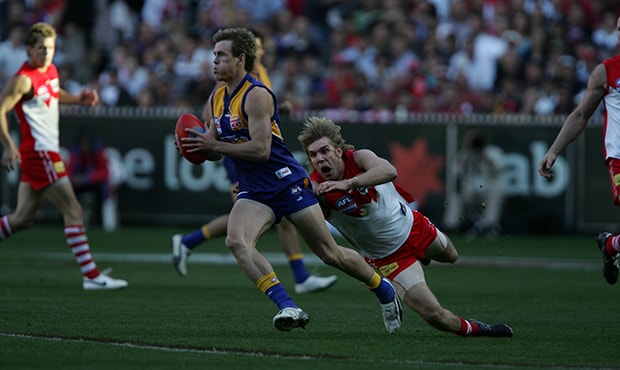By most measures, defender Brett Jones had a good season. A very good season. It says enough when you’re in the selection frame for every match.
Upon closer inspection of the fine print, yes, Jones was on the minds of the match committee but when it came to selecting the team, frustratingly, he spent more time on the cusp.
Naturally, decisions were based on match- ups, in Jones’ case the best stoppers for the opposition forwards. Although he offered versatility to play on opponents of various sizes and capabilities, so did other teammates. For the match committee it was a matter of getting the balance right and, for Jones, showing why he was a better choice than the next man. For every Thursday of the season, he was on tenterhooks. He was odds- on to be an emergency at worst but, like his teammates, he wanted to be playing senior football.
Jones had been patient before. A late bloomer in football terms, four years ago he was playing the amateur ranks before given an opportunity with WAFL club Claremont in 2003. Humble beginnings, sure, but Jones had set a standard from his AFL debut that transpired to every facet of his game. When he wasn’t playing with West Coast, the Tigers benefited.
In season 2005, he played the first 21 rounds before being dropped for round 22 only to reclaim his spot for the qualifying final against Sydney. And his finals series could have seen him play in the preliminary and grand finals if not for a quad strain. He toiled very well in that match.
Ironically, a significant moment in Jones’ blooming career took place in round 15 of the 2006 campaign. Having not played for West Coast since round six, he was recalled for the clash with guess who? Sydney. He played well in the low-scoring affair and retained his spot for the following match against Collingwood. It was the right time of the season to find form, especially as the side searched to settle with finals football looming.
Apart from the round 19 match against the Kangaroos, when he was omitted to make way for ruckman Dean Cox who had returned from injury, Jones was doing most things right.
“It was just opportunity I guess and I think there’s a big group of us that are in that situation where it comes down to match-ups and balance every week,” he noted. “I think every single guy could have done the job and that’s the strength of the club. I was just excited to get the opportunity and glad that it worked out well.
“I think it’s exciting from the point of view that you’ve been able to be part of a team that could win a premiership and still know you’ve got a lot of improving to do and a lot more hard work. Hopefully we’re all still willing to do that as a group and see the success continue.”
Throughout the 2006 finals series, Jones “really didn’t think too much about last year at all”, instead focusing on the tasks at hand. He was terrific against the Swans, handy against the Western Bulldogs and convincing against Adelaide. Jones would play in a grand final.
Though it wasn’t a sparkling performance, he started on all-Australian Ryan O’Keefe and collected half of his 16 possessions in the first quarter alone. He also found a couple of opportunities outside his normal territory, sending the ball into attack as West Coast looked to build on its lead over the Swans.
That lead was at its bare minimum late in the final term when Jones was forced to leave the field with cramp.
“Luckily my opponent came off with me, I think he was stuffed but it was one of those frustrating situations and I obviously wanted to get back out there ASAP,” he said. “When the message came down that there was only one second, it was a lot of relief.
“I was next to Seaber (Mark Seaby) I think. We just both jumped straight up and once we got out there on the field, we sort of looked at each other and decided we should try to celebrate somehow.
“We really didn’t know what to do I don’t think, both of us. Once a few of the other guys came storming by, you sort of follow the leader and just get going with hugging and enjoying the moment.”
It was at that moment that Jones and seven of his teammates had created their own little piece of history. Guernsey number 38 had won its first flag.
“It’d be very nice to be the first name up on that locker and I guess it’s something that will be there for a long time,” he acknowledged. “Hopefully I can come back and always see it at the club and one day, you never know, have kids or something and they can see the name on the locker as well.
“It’s weird saying that because obviously you still look at the lockers when you come in and see the ’92 and ’94 names and they’re some pretty respected guys around the club.”
Perhaps the respect the new breed has earned is best summarised by the masses of supporters that joined in the recent celebrations, both in Melbourne and the West Coast Eagles’ home of Perth. It was another proud instalment.
“It’s been amazing how many people have been willing to come out to the functions and the parades,” Jones said the week after the win. “That’s probably the surreal part that doesn’t really sink in, how many people you’ve had a chance to give some enjoyment to.
“It really is overwhelming how much impact one football game can have on the public.”



